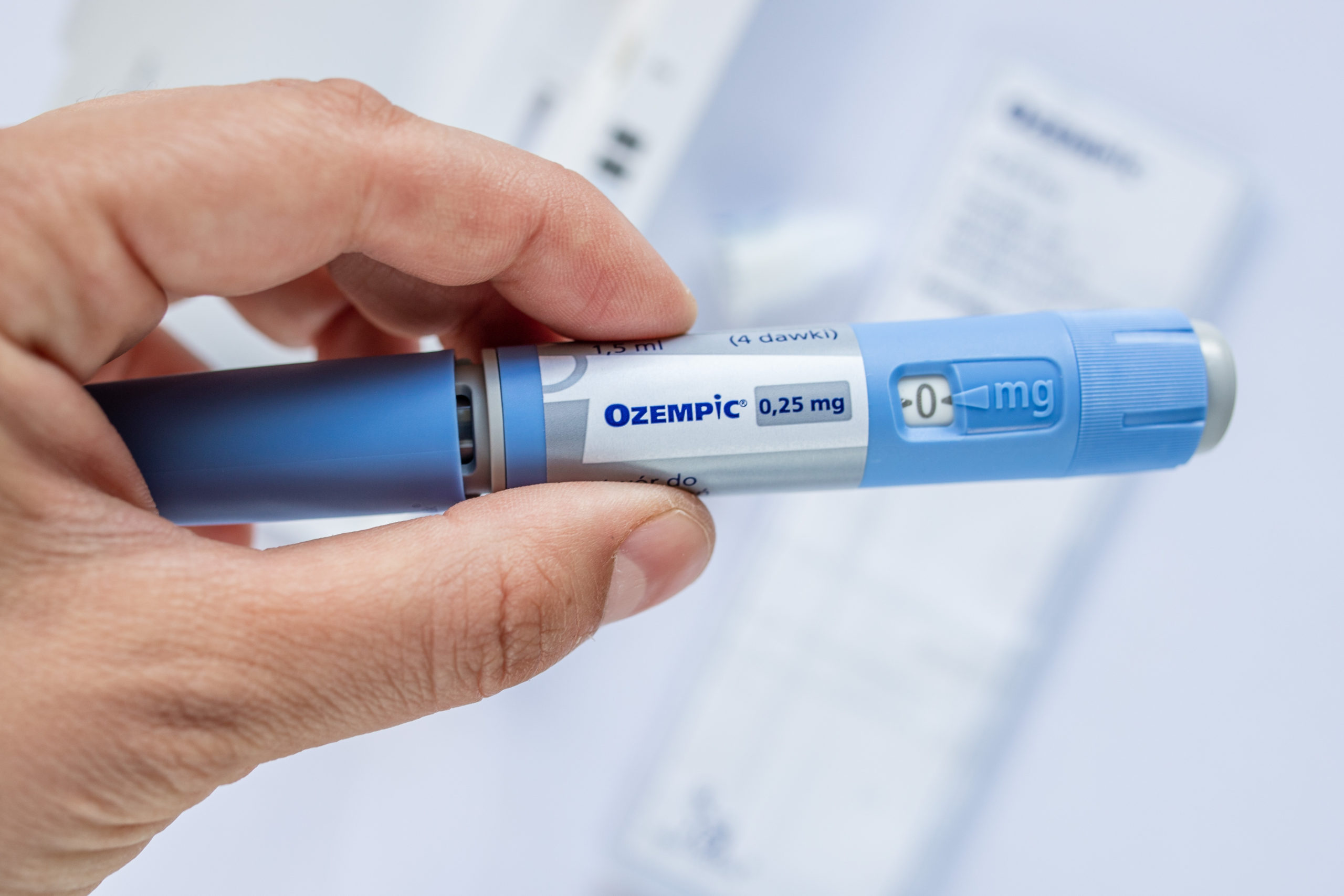
UP TO 40% OFF SITEWIDE






Metformin vs Ozempic: A Comprehensive Comparison


Table of Contents
- Understanding Metformin and Ozempic
- What is Metformin?
- What is Ozempic?
- Comparing Metformin and Ozempic
- Efficacy of Metformin vs Ozempic
- Side Effects of Metformin vs Ozempic
- SugarMD Advance Glucose Support
- Cost of Metformin vs Ozempic
- Metformin and Ozempic for Weight Loss
- Weight Loss with Metformin
- Ozempic for Weight Loss
- Metformin and Ozempic in Combination
- Making the Choice: Metformin or Ozempic?
- Frequently Asked Questions
- 1. What is the difference between Metformin and Ozempic?
- 2. What are the efficacy rates of Metformin vs Ozempic?
- 3. What are the side effects of Metformin and Ozempic?
- 4. How much do Metformin and Ozempic cost?
- 5. Can Metformin and Ozempic be used for weight loss?
- 6. What are the potential benefits and risks of using Metformin and Ozempic in combination?
- About The Author
Metformin and Ozempic are two of the most commonly prescribed medications in managing diabetes. Both medications are effective at helping to reduce high blood sugar levels, but how do they compare? In this article, we will look at how Metformin and Ozempic compare, the efficacy of each drug, possible side effects, cost, and how they may help with weight loss.
We will also delve into patient experiences and clinical studies, and provide a balanced view to help readers make an informed decision about which medication might be best for them. Let’s delve into the details.
Understanding Metformin and Ozempic
Consider Metformin and Ozempic: both are prevalent in the arsenal of prescription medications prescribed to combat type 2 diabetes. These potent drugs, having earned their stamps of approval from the Food and Drug Administration (FDA), present a collection of shared benefits.
Yet, they're not identical twins - key differences stand out, crucial to ponder when selecting the optimal choice for diabetes treatment.
What is Metformin?
A common term in the diabetic treatment world, Metformin, known generically as metformin hydrochloride, is a stalwart oral medication, rooted in the biguanides class of drugs. It's a front-runner in the race against type 2 diabetes. The mechanism of Metformin is rather clever – it puts a check on the sugar quantities your liver liberates into your bloodstream, simultaneously reducing the sugar your body ingests from your meals.
And that's not all - it sharpens the body's insulin sensitivity, guiding the reduction of blood sugar levels. The story of Metformin stretches back to the late 1950s, when its potential for diabetes treatment was recognized. The FDA nodded its approval in 1995. From there, Metformin rocketed to be one of the most popular prescriptions worldwide for type 2 diabetes.
It's handy as an oral tablet, a time-release tablet, or an oral solution. Typically, Metformin is swallowed once or twice daily alongside meals, playing an essential role in blood sugar control. The drug doesn't leap into action immediately - depending on the dose, the effects may be noticeable within days or stretch into a few weeks.
Remember, it's a no-go if you have kidney issues or are on dialysis. Research backs up Metformin's efficacy in taming blood sugar levels for those grappling with type 2 diabetes. Studies illustrate a lower cardiovascular disease risk for diabetic patients and a reduced chance of developing type 2 diabetes for those teetering on the edge.
Plus, Metformin's track record shows promise for patients wrestling with weight loss. Metformin, when used responsibly, is a reliable ally against type 2 diabetes. Regular blood sugar monitoring is vital, and misuse could invite hypoglycemia. If questions bubble up or unusual symptoms pop, reach out to a doctor pronto.
What is Ozempic?
Introducing Ozempic: a newcomer to the diabetes medication family. This drug battles against high blood sugar levels in people who have type 2 diabetes. It promotes the release of insulin from the pancreas when blood sugar peaks. But that's not its only superpower - it also curbs the amount of glucose produced by the liver and absorbed from your food.
Ozempic stands under the banner of glucagon-like peptide-1 (GLP-1) agonists. This hormone, a natural body secretion, helps maintain a healthy balance of blood sugar levels.
Ozempic mimics GLP-1's actions, effectively managing blood sugar levels and preventing diabetes-related complications. This medication comes as a weekly injection, in doses of either 0.25 mg or 0.5 mg, based on the doctor's discretion.
Food or no food, Ozempic performs consistently and should be taken weekly, like clockwork. Keep in mind, this is not a magic bullet – a balanced diet and regular exercise remain crucial. Ozempic has proven its mettle in decreasing complications from type 2 diabetes, like heart disease and stroke. It can fend off serious infections and complications from high blood sugar levels.
And it has a beneficial impact on A1C levels, a reflection of average blood sugar over time. Most people get on well with Ozempic. Common side effects may include mild nuisances like nausea, diarrhea, and headaches.
However, a minority may face severe side effects such as pancreatitis, allergic reactions, and a heightened risk of pancreatic cancer. Thus, it's crucial to thoroughly discuss potential risks and side effects with your doctor before starting Ozempic.
Comparing Metformin and Ozempic
When navigating the maze of diabetes treatments, the light of clarity illuminates our path when we delve into the labyrinthine complexities of Metformin versus Ozempic.
These two remedies, each with a basket of merits and a sprinkling of risks cater to diverse individual needs. Let's embark on a journey to understand the nuances and idiosyncrasies that make these medications unique and pivotal in managing diabetes.
Efficacy of Metformin vs Ozempic
What makes Metformin stand apart is its fascinating knack to curb the glucose surge from the liver, paving the way for a dip in blood sugar levels. But there's more! Metformin raises insulin sensitivity, propelling its efficiency within the body. Researchers have unveiled Metformin's role in cutting back A1C levels, shedding light on long-term blood sugar control.
Intriguingly, Ozempic operates on a distinct track. It puts brakes on glucose absorption from your digestive tract and, akin to Metformin, also amplifies insulin sensitivity. Ozempic has another feather in its cap; it decelerates carbohydrate breakdown, thus dialing down glucose in the bloodstream.
Ozempic and Metformin share the stage when it comes to reducing A1C levels, with numerous patients endorsing Ozempic's superiority over Metformin in reigning in their diabetes.
Despite the common ground, the two medications diverge in their effectiveness. Metformin holds the upper hand in mitigating the peril of hypoglycemia, a severe diabetes offshoot. Conversely, Ozempic outshines in slashing fasting blood glucose levels.
Of significance is that both medicines have claimed victory in regulating blood glucose levels. While Metformin and Ozempic have both proved instrumental in taming diabetes, personal needs and preferences play a pivotal role in selecting the perfect fit. Don't forget to loop in a medical expert to ascertain that your prescription aligns with your unique needs.
Side Effects of Metformin vs Ozempic
Plunge into Metformin's side effects, and you'll likely encounter gastrointestinal issues like nausea, abdominal pain, bloating, and diarrhea. On rare occasions, Metformin can trigger lactic acidosis, a lethal condition demanding immediate attention. Shifting gears to side effects of Ozempic, it's less notorious for gastrointestinal troubles.
Nevertheless, it does exhibit side effects, including nausea, abdominal pain, bloating, diarrhea, headaches, and dizziness. Watch out for reactions at the injection site, such as redness, swelling, or itching. Also, keep tabs on hypoglycemia, a potentially serious outcome necessitating vigilant monitoring. Metformin and Ozempic share another common trait: an elevated risk of vitamin B12 deficiency.
Given the vitamin's paramount importance, a deficiency may result in serious health complications. Both medications also connect to a heightened lactic acidosis risk, a critical condition causing dizziness, confusion, breathing difficulties, or even death. Remember to keep your radar on for symptoms of lactic acidosis.
Moreover, both Metformin and Ozempic may induce cholesterol level shifts, necessitating regular monitoring while on these medications. Keeping tabs on blood pressure, kidney function, and liver function also features prominently on the checklist.
Never hesitate to seek your doctor's guidance about the potential side effects of Metformin and Ozempic. Your doctor can help you navigate the pros and cons of each medication, enabling you to make an informed decision.
SugarMD Advance Glucose Support
Maintaining healthy blood sugar levels can be a challenge. From carby meals to snacks and even with all the effort, it’s still not enough. That’s where SugarMD Advanced Glucose Support comes in.
Our blend of traditional Ayurvedic herbs helps regulate blood sugar levels, curbs cravings, supports weight loss, and boosts metabolism and energy. Endorsed by endocrinologists, this unique formula of pure, potent herbs promotes overall blood sugar health. Ideal for both pre-diabetics and Type 2 diabetics.
Cost of Metformin vs Ozempic
In managing chronic conditions like type 2 diabetes, the medication's cost often poses a significant hurdle. The price tag for Metformin varies, based on factors like dosage, form, and quantity. A month's supply of generic Metformin hovers between $4 and $20, contingent upon the pharmacy or online retailer.
Its brand name counterpart, Glucophage, though pricier, remains reasonably affordable, costing between $18 and $60 for a 30-day supply. In contrast, Ozempic surpasses Metformin in terms of cost. A month's supply of generic Ozempic, semaglutide, sets you back anywhere between $400 and $600.
The branded version, available only as an injectable, can push the bill north of $1,000 for a month's supply. On top of the medication cost, consider the additional expenses linked with Ozempic injections and the necessary supplies.
Insurance may cushion some of these costs, so it's worthwhile to touch base with your provider. Though Ozempic's price may initially seem steep, it could prove cost-effective in the long run, given its superior efficacy in reducing blood sugar levels and minimizing long-term complications compared to Metformin.
Metformin and Ozempic for Weight Loss
Weight Loss with Metformin
Metformin, primarily a diabetes drug, is now a popular option among those seeking innovative weight management solutions. Originally intended for controlling blood sugar in Type 2 diabetes patients, Metformin has caught the public eye due to an intriguing side effect - weight loss. Recent research indicates that including Metformin in weight loss strategies could deliver amplified results.
The connection between Metformin and weight loss lies in its effect on blood insulin and glucose levels. Lowering these levels might curb appetite, making it easier to resist indulging. Additionally, by boosting the body's insulin sensitivity, Metformin can discourage fat storage and diminish inflammation, paving the way for weight loss.
Besides curbing appetite, Metformin can help stifle cravings for unhealthy, processed, or high-calorie foods. This assists people in adhering to their weight loss regimen, moderating blood sugar, and reducing sugar and carbohydrate cravings. But it's not all rosy; side effects such as nausea, vomiting, and diarrhea can occur. Always consult with your doctor about potential side effects before adding Metformin to your weight loss toolbox.
Ozempic for Weight Loss
Clinical trials paint a promising picture of Ozempic as a weight loss tool. In one study, participants on Ozempic shed 13.4% of their body weight over 12 weeks, while placebo participants lost just 4.8%. Another study showed participants on Ozempic for 56 weeks losing 13.2% body weight against 5.7% by the placebo group. However, Ozempic isn't free from side effects.
Users may experience nausea, vomiting, stomach pain, headaches, and excessive sweating. Rarer, yet more serious, side effects can include pancreatitis, kidney injury, and hypoglycemia. Particularly when used with other diabetes drugs, Ozempic may trigger low blood sugar, so proceed with caution. Ozempic is administered as a weekly injection, typically into the abdomen, and is best taken post the day's first meal (but not during the meal or a snack). Overall, for those trying to shed pounds and mitigate heart disease risk, Ozempic might be an effective aid, but only after discussing benefits and risks with a healthcare provider.
Metformin and Ozempic in Combination
In the realm of treating Type 2 diabetes, Metformin and Ozempic make a potent duo. Their combined might helps enhance glycemic control and minimize long-term diabetes complications. The pair also serve to lessen cardiovascular event risk Benefits of this combination go beyond improved glycemic control and encompass increased insulin sensitivity and better lipid profiles.
This can be especially helpful for Type 2 diabetes patients, as it can cut down the risk of microvascular and macrovascular complications linked to the disease. The Metformin-Ozempic team can also contribute to weight loss. Ozempic reduces food intake and cravings, while Metformin curbs liver glucose production to prevent excessive weight gain.
Plus, the combo may prove helpful in managing lipid disorders, leading to healthier cholesterol levels. However, combining Metformin and Ozempic does have potential downsides. Side effects may become more pronounced, including hypoglycemia, upset stomach, headaches, dizziness, and nausea. The combination could also escalate the risk of lactic acidosis, a severe and potentially fatal condition.
Moreover, mixing Metformin and Ozempic could result in drug interactions. Therefore, always consult your healthcare provider before attempting this combination. They can guide you on the safest course of action, considering your specific needs and any other medications you might be taking.
In sum, the Metformin-Ozempic alliance could deliver significant benefits, like enhanced glycemic control and a reduced risk of diabetes complications. But it's not a decision to be taken lightly. There are potential risks involved, so it's crucial to consult your healthcare provider first.
Making the Choice: Metformin or Ozempic?
Dabbling in the world of diabetes medication isn't a walk in the park. Weighing out advantages, disadvantages, expenses, and potential side effects often become essential. Not to mention, the value of individual patient experiences and clinical studies when navigating through the choices of Metformin and Ozempic.
A plethora of research exists, dissecting efficacy, side effects, pricing, and more - crucial in shaping a well-informed decision catering to one's unique needs. Ultimately, the tug of war between the benefits and drawbacks of each medication rests in the hands of the patient.
Metformin and Ozempic, each boasting their unique pros and cons, demand patient deliberation before the final nod. The preferred choice, at the end of the day, swings on the individual's preferences and needs.
Frequently Asked Questions
1. What is the difference between Metformin and Ozempic?
Metformin is a medication that is used to treat Type 2 diabetes. It works by decreasing the amount of sugar produced by the liver and increasing insulin sensitivity.
Ozempic is a similar medication, but it is a newer, more potent type of medication that is injected. Whereas Metformin is taken orally, Ozempic is injected. Ozempic can also be used in conjunction with Metformin to increase its efficacy.
2. What are the efficacy rates of Metformin vs Ozempic?
The efficacy of Metformin and Ozempic in treating Type 2 diabetes has been studied extensively. According to several clinical studies, Ozempic has been found to be more effective in reducing blood sugar levels than Metformin. In one study, it was found that patients taking Ozempic saw a reduction in HbA1c levels of 1.3% compared to a reduction of 0.9% in patients taking Metformin.
3. What are the side effects of Metformin and Ozempic?
The side effects of Metformin and Ozempic are similar in nature. Both medications may cause gastrointestinal upset, such as nausea, vomiting, and diarrhea.
Metformin may also cause anemia, muscle pain, and headaches. Ozempic may cause a decrease in appetite, weight loss, and injection site reactions.
4. How much do Metformin and Ozempic cost?
The cost of Metformin and Ozempic varies depending on the dosage and the number of tablets or injections a patient needs to take. Generally, Metformin is more affordable, but it may not be covered by some insurance plans. Ozempic, on the other hand, is typically more expensive, but it is usually covered by most insurance plans.
5. Can Metformin and Ozempic be used for weight loss?
Yes, both Metformin and Ozempic can be used for weight loss. Metformin can help reduce the amount of sugar produced by the liver, which can help with weight loss. Ozempic can help reduce appetite and increase satiety, which can also help with weight loss.
6. What are the potential benefits and risks of using Metformin and Ozempic in combination?
Using Metformin and Ozempic in combination can be beneficial for some patients, as it can help reduce blood sugar levels more effectively than either medication alone. That said, it is important to be aware of the potential risks.
Combining the two medications may increase the risk of hypoglycemia, so patients should be closely monitored while taking the combination. Additionally, the use of Metformin and Ozempic together may increase the risk of side effects, so it is important to discuss the potential benefits and risks with a doctor before starting this combination.
About The Author
Meet Dr. Ahmet Ergin a highly skilled and dedicated endocrinologist with a passion for diabetes care. Dr. Ergin earned his medical degree with honors from Marmara University in Istanbul. He completed internal medicine residency and endocrinology fellowship at Cleveland Clinic.
Dr. Ergin is board-certified in Internal Medicine, Endocrinology, Diabetes, and Metabolism due to his vast medical expertise. He's a certified diabetes educator, author of "The Ultimate Diabetes Book," and founder of "the SugarMD YouTube channel."
Dr. Ergin offers exceptional diabetes care to his patients in Port Saint Lucie, FL, helping them manage effectively. Disclaimer: These statements have not been evaluated by the Food and Drug Administration. Information on this website isn’t intended to treat, cure or prevent any disease. Discuss with your doctor and do not self-treat.
Written By Dr. Ahmet Ergin
464 total articles
Meet Dr. Ahmet Ergin, a highly skilled and dedicated endocrinologist with a passion for diabetes care. Dr. Ergin earned his medical degree with honors from Marmara University in Istanbul. He completed internal medicine residency and endocrinology fellowship at Cleveland Clinic. Dr. Ergin is board-certified in Internal Medicine, Endocrinology, Diabetes, and Metabolism due to his vast medical expertise. He's a certified diabetes educator, author of “The Ultimate Diabetes Book,” and founder of “the SugarMD YouTube channel.” Dr. Ergin offers exceptional diabetes care to his patients in Port Saint Lucie, FL, helping them manage effectively. For a closer look into his insights and experiences, connect with Dr. Ahmet Ergin on LinkedIn, Instagram, and YouTube.”
Disclaimer: These statements have not been evaluated by the Food and Drug Administration. Information on this website isn't intended to treat, cure or prevent any disease. Discuss with your doctor and do not self-treat.
Products















